|
|
|
Sort Order |
|
|
|
Items / Page
|
|
|
|
|
|
|
| Srl | Item |
| 1 |
ID:
085891
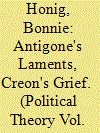

|
|
|
|
|
| Publication |
2009.
|
| Summary/Abstract |
This paper reads Sophocles' Antigone contextually, as an exploration of the politics of lamentation and larger conflicts these stand for. Antigone defies Creon's sovereign decree that her brother Polynices, who attacked the city with a foreign army and died in battle, be dishonoured - left unburied. But the play is not about Polynices' treason. It explores the clash in 5th century Athens between Homeric/ elite and democratic mourning practices. The former (represented by Antigone) memorialize the unique individuality of the dead, focus on the family's loss and bereavement and call for vengeance. The latter (represented by Creon) memorialize the dead's contribution to the immortal polis and emphasize (as in the Funeral Oration) the replaceability of those lost. Each economy of mourning sees the other as excessive and politically unstable. The remainders of both, managed by way of exception institutions such as tragedy and the Dionysian Festival, continue to haunt us now.
|
|
|
|
|
|
|
|
|
|
|
|
|
|
|
|
| 2 |
ID:
115471
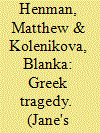

|
|
|
| 3 |
ID:
149572
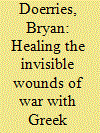

|
|
|
|
|
| Summary/Abstract |
Translator and theater director Bryan Doerries describes how he has used ancient Greek tragedies to disrupt hierarchies and create a space for members of the military “to tell their truths of the experiences of war.” Drama can help people suffer openly and communally, sharing the burden of war memories across a community.
|
|
|
|
|
|
|
|
|
|
|
|
|
|
|
|
| 4 |
ID:
113827
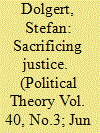

|
|
|
|
|
| Publication |
2012.
|
| Summary/Abstract |
Democratic theorists have increasingly turned to Aeschylus' Oresteia as a resource for challenging the shortcomings of liberal theory, but I argue that this particular return to Greek tragedy should be treated with a healthy dose of skepticism. Defenders of Aeschylean justice have underplayed the sacrificial aspects of his solution to the problem of civil strife, mistaking the consent of the Furies for a resolution that escapes the cycle of violence. Drawing on elements of Greek ritual practice, I contend that Aeschylus folds the consent of the Furies into a sacrificial framework which denies the violence it enacts by directing this violence toward nonhumans. As a consequence Aeschylean justice is complicit in continuing the sacrificial economy it seems to subvert, and Aeschylean politics relies on the suffering of nonhumans (and humans) to secure its conception of order.
|
|
|
|
|
|
|
|
|
|
|
|
|
|
|
|
| 5 |
ID:
144577
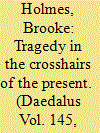

|
|
|
|
|
| Summary/Abstract |
A number of developments in the study of Greek literature over the past few decades have broken down boundaries of canon and genre, opening up a wide range of texts once deemed degenerate or unavailable to literary analysis, expanding the networks within which literary texts are interpreted, and bringing renewed attention to the reception of ancient texts in later periods up to the present. The rise of reception studies, in particular, raises new questions about how our own position within specific present moments not only imposes constraints on the interpretation of ancient texts but also enables it. In this essay, I survey these developments using Greek tragedy, the most canonical of genres, as a case study. I argue that we need to develop strategies of interpretation more attuned to resonances between contemporary quandaries and our extant tragedies while remaining committed to forms of social and historical difference. I pay particular attention to the problems of agency that tragedy raises at the juncture of the human and the nonhuman worlds.
|
|
|
|
|
|
|
|
|
|
|
|
|
|
|
|
| 6 |
ID:
077211
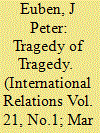

|
|
|
|
|
| Publication |
2007.
|
| Summary/Abstract |
There are good reasons to consider tragedy, especially Greek tragedy, a resource for current debates in international relations. This is not only because of the ethical and political dilemmas tragedy explores with such dramatic force, but because tragedy is a significant context for reading Thucydides with the political and literary acumen he demands. To ignore this context is to domesticate the ways tragedy challenges both our conventional readings of Thucydides as well as our substantive views of politics and the ways we study it. While this article fully supports the enterprise of invigorating classical realism with the study of tragedy and of posing the question, 'What can a tragic sensibility contribute to our understanding of international politics?', it makes that enterprise and that question more rather than less problematic. But it does so in the name of Greek tragedy and for an ultimately more challenging appropriation of it.
|
|
|
|
|
|
|
|
|
|
|
|
|
|
|
|
| 7 |
ID:
164256
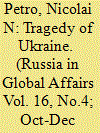

|
|
|
|
|
| Summary/Abstract |
As the war in Ukraine enters its fifth year, it remains mired in debt, corruption, and strife. The country seems to be caught up, again, in a vicious cycle that has been repeating itself for decades, if not centuries. Classical Greek tragedy gives us a deeper look at the reasons behind Ukraine’s persistent failure to achieve social stability, and to suggest remedies. The tragic cycle can be broken through a compromise in which individual, social and divine aspirations for jus-tice are reconciled. As long as Ukrainian leaders seek to achieve justice without compromise, the nation’s self-destructive cycle is likely to persist.
|
|
|
|
|
|
|
|
|
|
|
|
|
|
|
|
| 8 |
ID:
141804
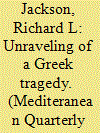

|
|
|
|
|
| Summary/Abstract |
Conflicting narratives of Greece in 2015 portrayed it as victim of German greed and its export-driven economy and as villain for borrowing $273 billion it could never hope to repay. Both have truth, but the confrontation in Brussels between debtor and creditors was long in coming and the result of error on both sides. While an interim agreement was reached on 20 February 2015 to extend Greece’s bailout by four months, the longer-term outcome was far from clear. Social and economic pressures had been building in Greece since 2008, resulting in the 25 January 2015 election of a radical government pledged to end austerity, reverse privatization, and reforms and to achieve at least partial debt forgiveness. A Greek departure from the eurozone was possible. A Greece adrift would leave it vulnerable to the blandishments of Russia, China, and other parties. Should such a shift occur, it would haunt the European Union in future crises of its southern tier or with other weaker member states.
|
|
|
|
|
|
|
|
|
|
|
|
|
|
|
|
|
|
|
|
|